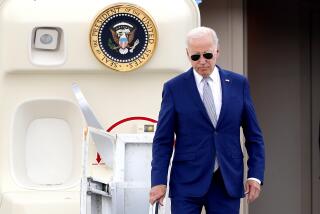From Clinton, a Caution on Hong Kong, but No Threat
- Share via
WASHINGTON — President Clinton on Tuesday urged China to respect human rights in Hong Kong after the British colony reverts to Chinese sovereignty in July, but he ruled out retaliation by the United States if Beijing rejects his advice.
At a White House news conference, Clinton acknowledged that his policy of “engagement” with Chinese leaders--his decision to maintain regular economic ties--has not had the desired effect of improving Beijing’s dismal human rights record. But he said he has no plans to change that policy, because a U.S. attempt to isolate China would work no better.
“That does not mean that, if we had followed a policy of isolating ourselves from China when no one else in the world was prepared to do that, that we would have gotten better results,” he said.
His comments reflected his concern that China will crack down on civil liberties when it assumes control of Hong Kong despite its pledge to leave the territory’s open political systems unchanged for 50 years.
A group of legal experts on the China-backed Preparatory Committee, charged with overseeing Hong Kong’s transition to Chinese rule, recently recommended gutting the colony’s Bill of Rights and rolling back political freedoms.
But Clinton, echoing the case he made in 1994 for granting most-favored-nation trading status to China without regard to China’s human rights record, said that U.S. sanctions “wouldn’t help anything.” Rather, he said, China must be shown that any attempt to strangle civil rights in Hong Kong would backfire by sapping the economic vibrancy that China is counting on.
Some Chinese leaders, he said, believe that they can impose the mainland’s authoritarian political system on Hong Kong without damaging its economy. But he said it is doubtful that Hong Kong’s economic system “can exist with all of its potential to help China modernize its own economy and open opportunities for its own people if the civil liberties of the [Hong Kong] people are crushed.”
So, he said, an attempt to rein in civil rights “would be wrong on its own merits [and] might wind up being less useful to China. So I would hope very much that they would look for ways to maximize the continuation not only of the economic system but of the personal freedoms that the people of Hong Kong have enjoyed in making it such an economic engine.”
The proposals recommended by the Preparatory Committee would end almost a decade of democratic reforms and replace new laws with old British regulations intended to control political protests and restrict the creation of political parties. The measures would also repeal new laws expanding Hong Kong’s voter rolls.
Hong Kong has signed the International Covenant on Civil and Political Rights, but China has not.
Concerning the human rights situation on the mainland, Clinton suggested that it is “inevitable” that China ultimately will make its own political system more liberal even if the United States and the rest of the world does nothing to force the issue.
“The impulses of the society and the nature of the economic change will work together, along with the availability of information from the outside world, to increase the spirit of liberty over time,” Clinton said. He said that there is no way the Chinese government could stop that process, “just as eventually the Berlin Wall fell.”
Meanwhile, the United States must continue to do business with China, he said, arguing that the country is too big to be isolated.
More to Read
Sign up for Essential California
The most important California stories and recommendations in your inbox every morning.
You may occasionally receive promotional content from the Los Angeles Times.










